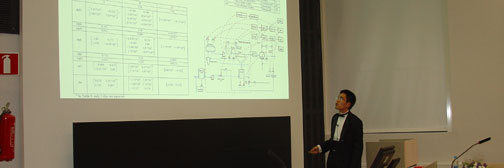| | Year 2016
Alexandre BoriouchkineDynamic modeling of a BioGrate boiler
Biomass utilization in energy production through combustion is regarded as an efficient alternative to consuming diminishing fossil natural resources. Furthermore, biomass is not only a naturally replenishable energy source, but is also CO2 neutral, and thus it is a sustainable option to satisfy the ever-growing energy demand. Existing combustion technologies such as industrial boilers and furnaces can utilize renewable fuels to a certain degree only, mainly when blended with traditional fossil fuels. Consequently, new technologies have been developed, such as BioGrate boilers, which can fully benefit from biomass fuel.
Furthermore, future energy systems will comprise an increasing variety of energy sources for flexible energy generation. This will impose new challenges on boiler systems in terms of rapid changes in power demand and the ability to operate under low-load conditions. Thus, the development of these systems will require an insight into the combustion process for the optimal design and operation of energy boilers. Mathematical modeling allows the acquisition of important knowledge on the combustion process and underlying phenomena.
This thesis presents a mechanistic model for a BioGrate boiler developed for process phenomena investigation, including an evaluation of the effect of varying particle size and moisture content on biomass combustion and the dynamic response of the burning fuel bed to a varying primary air supply. To improve the accuracy of the developed model, appropriate pyrolysis kinetics for the debarking residue were determined and the associated reaction heats were estimated from a mechanistic model of fixed-bed pyrolysis, which was also developed in this work.
In addition, a simplification of the developed model for process control and monitoring is presented. The simplified model demonstrated acceptable accuracy in comparison with the detailed model and faster-than-real-time computational times. Both models were successfully validated with experimental data and showed the ability to predict the observed experimental trends. The results indicate that the model provides valuable information for improving the efficiency of a BioGrate boiler.
Thesis electronical version can be downloaded from here
This info last modified 27 Apr 2024 by Jukka Kortela
|

